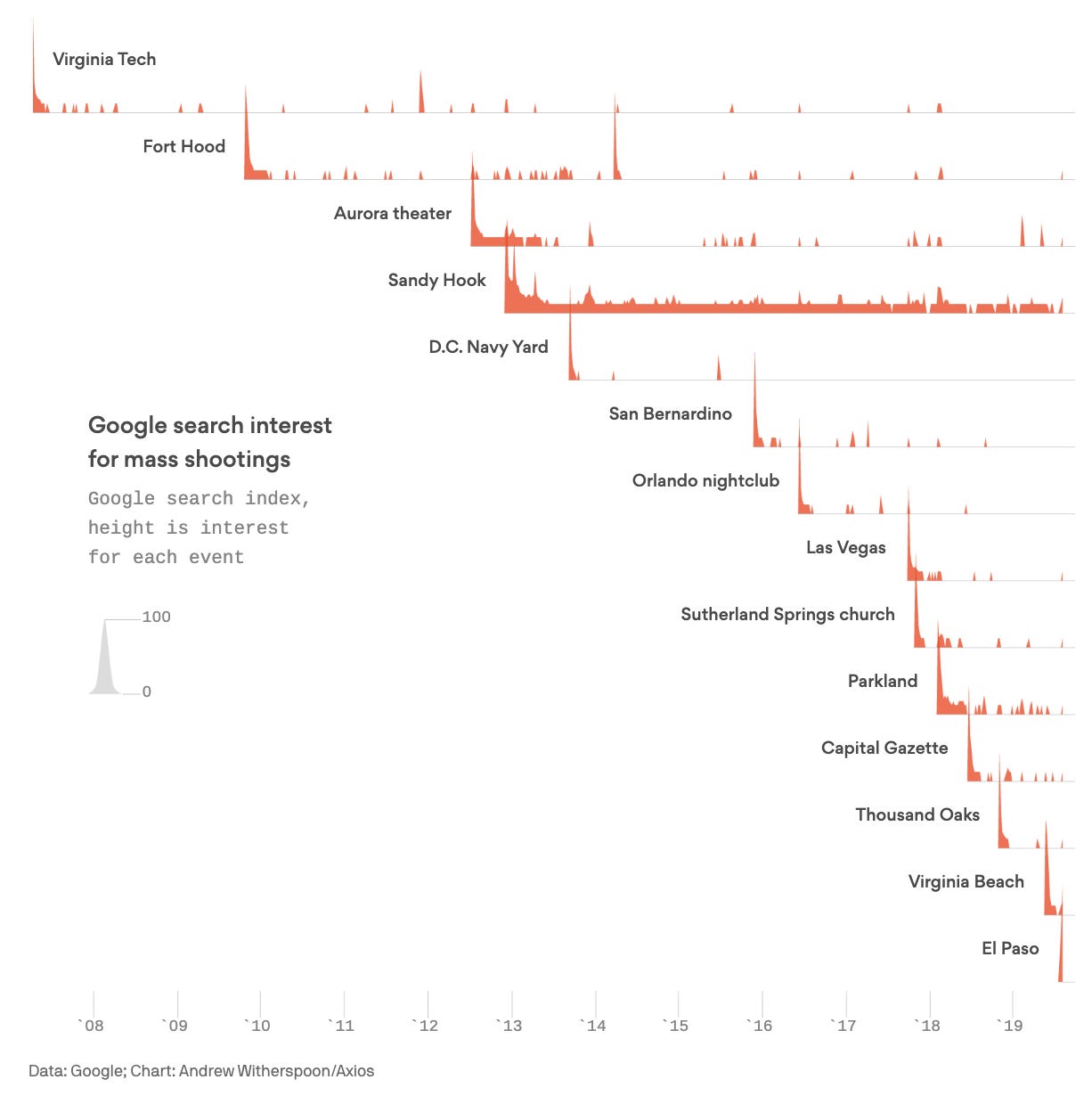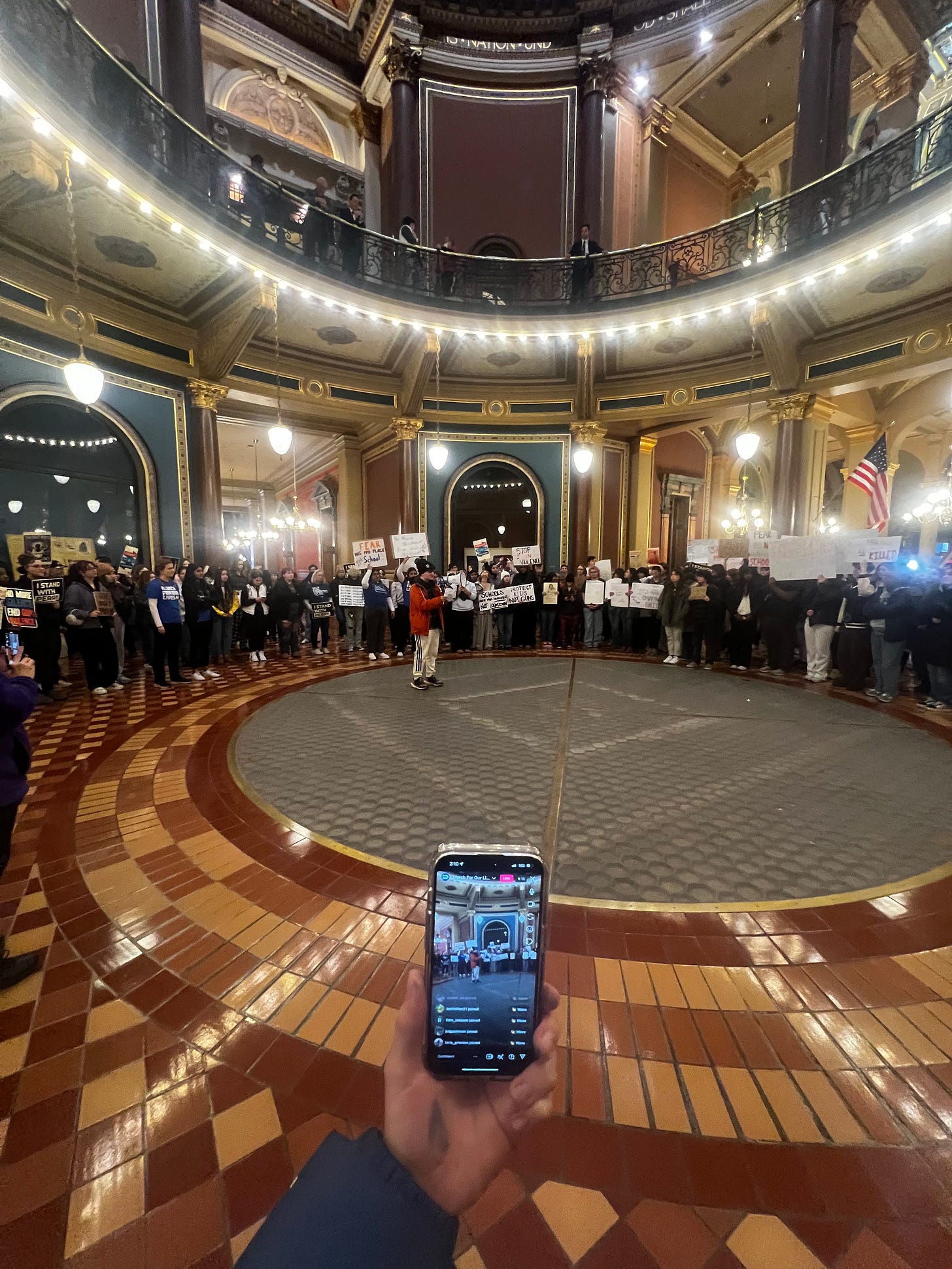The morning I arrived in Iowa was the first day back in school for many in the Des Moines area. It was also the setting for one of the deadliest school shootings in state history, in Perry High School — one killed, and several injured.
Our chaperone had mentioned to us a few weeks prior that across the street from our hotel was a state-of-the-art hospital. The victims of that shooting were treated at that hospital.
My experience in Iowa was irrevocably tainted by this event and its aftermath, both its effect on the Republican primary and its effect on gun violence organizing, which sprung into action to hold a widely publicized protest at Iowa’s state capitol the following Monday.
These two forces largely ran parallel to each other — the protest was focused on state-level reforms — but they provide a useful insight into what makes gun violence work sustainable, and what doesn’t.
At the risk of insulting everyone who works in this space, I’ll start by saying that this movement should probably be more effective than it currently is. Gun violence, especially in the school shooting context, is one of the starkest forms of violence around. It is inflicted on a setting that everyone considers sacred, and it is inflicted on a population that everyone considers sacred: students, kids:
Mass shootings more generally are overemphasized in the news:
Statistics have shown that one in four Americans perceive mass shootings to be the greatest gun violence threat facing their communities, but the study showed that shootings with multiple victims occurred just 22 percent of the time. However, mass shootings were almost six times as likely to make the news. — Preventative Medicine Journal
Many issue movements wish they had the same visibility as gun violence. I work in the gerrymandering space as well — gerrymandering is one of the most obscure problems to describe, ever. The word is long, its description requires math, and most progress is made in the courts.
Yet, it needn’t be said that this wish is cursed. Gun violence is a stark form of violence because it is so explicitly violent. When tragedy occurs, blood is spilled.
The gun violence movement has fallen into the trap of becoming too reliant on tragedy. We are too reliant on responding to school shootings or mass shootings, where attention peaks sharply, and where it otherwise declines sharply.

the republican playbook
The Republican establishment has no problem dealing with attention instability because they are trying to suppress the problem instead of building toward an actual solution. The well-defined Republican playbook was on full display in Iowa, as every single candidate rode the wave of gun violence attention in style.
On the Thursday of the Perry shooting, I first went to a small event with Vivek Ramaswamy. After telling the audience about his experience talking to the affected parents, Vivek explained that he has two sons and that he couldn’t bear the thought of wondering if his children would ever be affected in the same way. His wife was at his side while he said this, holding up their older son.
He then argued that three armed security guards should be installed at every single school campus. There is comprehensive evidence debunking the efficacy of such a policy:
A recent study by researchers from The Violence Project suggests that armed guards in schools don’t reduce fatalities. Researchers examined 133 school shootings and attempted school shootings between 1980 and 2019, tallied up by the K-12 School Shooting Database. At least one armed guard was present in almost a quarter of cases studied, and researchers found no significant reduction in rates of injuries in these cases. In fact, shootings at schools with an armed guard ended with three times as many people killed, on average. — The Trace
More interesting is that DeSantis, Haley, and Ramaswamy all delivered effectively the same talking points when confronted on mass gun violence. Here’s a rough procedure, for anyone interested in running for President as a Republican (I wish I was being satirical):
Talk about your family. Talk about your kids and your partner and talk about how you couldn’t bear to think about your family being torn apart by gun violence. If you can have your family with you on stage as you do this, even better.
Talk about how crazyhead all these people are. How could someone possibly do this! Talk about investing in counseling and mental services. (BTW — this is also very incomplete. More here)
Talk about arming the teachers or arming the security guards.
The combination of these three steps allows all of these candidates to ride the wave of the news cycle and land in style by the time attention fades. These talking points rest on the reality that we cannot reliably deny these candidates of their familial love, we cannot deny them of their assertion that these people are crazy, and we cannot deny them of their abhorrence of violence (at least not credibly).
Then, the candidates capitalize on the fear of an impending ban — in the same way gun manufacturers see demand soar after shootings — to double down on a “more guns, more safety” narrative.
the organizing playbook
At its worst, gun violence organizing waits for school / mass shootings to happen (anniversaries are fair game too), and then tries to capitalize off this attention to push policy. There are several serious flaws with this approach:
According to this strategy, organizers are stuck wishing that shootings don’t happen anymore but knowing that more shootings need to happen for this to be accomplished
Violence at this level is normalized and recognized as a fact of life when it is embedded this deeply inside organizing strategy
Negative energy drives the movement, leading to burnout and hopelessness
As it is so predictable, organizers who use their lived experience as their only asset are vulnerable — as the resistance to this movement turns this lived experience into a burden instead of an asset. They tell organizers that they’re not thinking clearly or they tell them that they’re underinformed, or ungrateful for the beautiful America they’ve inherited.
I’ve used this before, but here is a conservative commentator in response to Parkland protests:
Harsanyi also wondered if "these kids understand that they attend schools that are safer than ever in a nation that has bequeathed them more freedom and wealth than any other group in the history of the world." — USA Today
At its best, gun violence organizing constructs systems to keep audience and organizer attention, even after the canonical news cycle shifts. This requires a shift of paradigm — how do you stretch the conversation?
Retaking the mental health frame. Instead of mental health —> gun violence, gun violence —> mental health. There is precedent for this. How do you think Republicans talk about veterans? Mental health is a lifelong conversation. Take this NYT article published on the effect of gun violence on mental health — it’s not directly written around any sort of shooting or anniversary.
Talking about student power. Media loves to talk about students — think school shootings, Israel vs Gaza, DEI, and climate power. In Iowa I got interviewed several times just by saying that I’m a student. Students are being talked about, so let’s tell them what we think more often.
Tying together gun violence with other progressive movements — which are fundamentally about the freedom to a way of life instead of a path to death.
Talking about gun violence beyond mass shooting. Gun violence is ubiquitous and most people wouldn’t know it.
Talking about organizing as an invitation into a community instead of a crisis management job. Here’s a snippet from an op-ed that UNC March for Our Lives never published in the Daily Tar Heel, that explains this better than I care to re-paraphrase:
We hope you can hear the hope in our writing. We don’t sulk in our meetings. We instead jump up and down in excitement with every new idea, every new member.
We cannot afford to wait for everyone to be traumatized by gun violence before society rediscovers the empathy we need to enact change. And we don’t have to wait either. We are not waiting. Because we know that no bullet moves faster than the speed of story.
Insert any progressive issue in place of gun violence, and the takeaway is the same. We see this energy, this addictive energy, in many of the progressive groups on this campus — and in our everyday conversations with peers on campus. UNC’s strong and vibrant history of activism is well and alive. We argue this is exactly because of the same rediscovery of student political resistance as love, as excitement, as fulfillment. - me
The protest last Monday at Iowa’s State Capitol was a formative on-the-ground organizing experience. It was emotional and invigorating and charged with the forward-facing energy that this movement needs.
Much more to come! This will be the last on Iowa (I am not really interested in the caucus results), and then reflections a first week in Singapore!




